Chinese New Year, Year of the Rat
Chinese New Year @ Wai Yee Hong
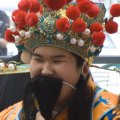 On 10th February 2008, Wai Yee Hong will be hosting some traditional Chinese New Year celebrations. These will include:
On 10th February 2008, Wai Yee Hong will be hosting some traditional Chinese New Year celebrations. These will include:
- Traditional Chinese Firecracker
- Traditional Unicorn Dance
- Dragon Dance
- Choi Sun (God of Prosperity)
- Chinese Percussion Performance
Festivities will be starting at 10:30am so don’t be late!
Chinese New Year
Chinese New Year falls on a different day every year according to the western calendar because the Chinese calendar follows lunar cycles. This year, Chinese New Year is on 7th February. Each year is assigned one of the 12 animal signs of the Chinese zodiac, which are: Dog, Pig, Rooster, Dragon, Ox, Sheep, Horse, Rabbit, Snake, Monkey, Rat and Tiger.
This year is the year of the Rat.
People born in the year of the rat are charming and have bright, happy personalities. Rats cherish friends and loved ones and as a result, family life is very important to them. They work hard and know how to handle their money.
Chinese New Year Food & Customs
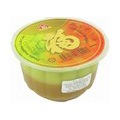 Much emphasis is placed on food during Chinese New Year, and some delicacies are served only at the New Year.
Much emphasis is placed on food during Chinese New Year, and some delicacies are served only at the New Year.
Nian Gou
This hard, sweet New Year cake is made from sticky rice powder and brown sugar. It is usually sliced and either steamed or pan fried. Some people also like to dip the slices in a whisked egg before pan frying.
Candied Fruits & Vegetables
It is traditional to eat candied fruits and vegetables at New Year. These usually include:
*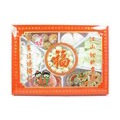 Water Chestnuts
Water Chestnuts
- Lotus Roots
- Coconut Strips
- Coconut Triangle
- Lotus Nuts
- Winter Melon
- Kumquat
- Carrots
More often than not, red and black melon seeds are also consumed at this time of year.
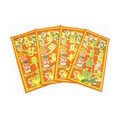
Fai Chun
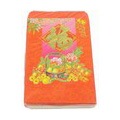 Scrolls bearing Chinese couplets are commonly hung in the house and on door frames at the New Year to give everyone good luck and success in everything they do.
Scrolls bearing Chinese couplets are commonly hung in the house and on door frames at the New Year to give everyone good luck and success in everything they do.
Lai See
Red envelopes (also known as Lai See in Cantonese) containing money are given from married couples to the young and elderly during the festivities.
